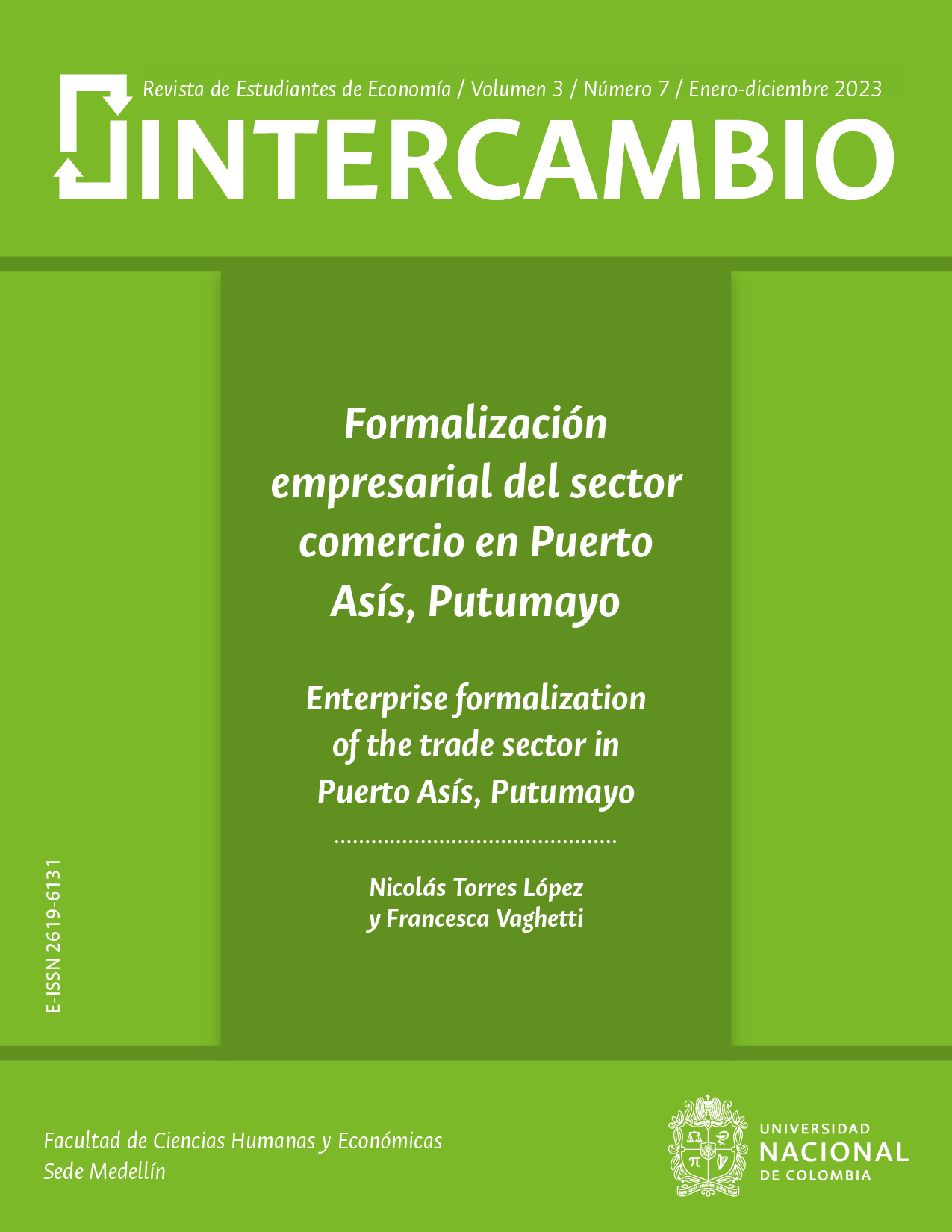Enterprise formalization of the trade sector in Puerto Asís, Putumayo
Keywords:
Business informality, public policies, accounting education, business growth, competitiveness, commercial sectorAbstract
More than 24% of the commercial enterprises in Puerto Asis, Putumayo, did not renew or register their commercial registry in 2021. This implies that the most important economic sector in the urban area of the most important municipality in the department is suffering from high rates of informality. For this reason, this document proposes a public policy agenda that seeks to attack this problem through education and investment. It also proposes the possibility of generating public-private partnerships that seek to strengthen business, thus leading to the consolidation of more sustainable and competitive companies both nationally and internationally.
References
Aksu, E., Erzan, R., & Kırdar, M. G. (2022). The impact of mass migration of Syrians on the Turkish labor market. Labour Economics, 76, 102183.
Alcaldía de Puerto Asís. (2020). Revisión y ajuste del plan básico de ordenamiento territorial de Puerto Asís, Putumayo. https://www.puertoasis-putumayo.gov.co/Transparencia/PlaneacionGestionyControl/DIAGNOSTICO%20V4%20ENE272021.pdf
Alcaldía de Puerto Asís. (2021). Convocatoria fondo educativo municipal para la educación superior. https://www.puertoasisputumayo.gov.co/Transparencia/BancoDocumentos/Convocatoria Fondo Educativo Municipal para la Educaci%C3%B3n Superior.pdf
Arango, L. E., & Flórez, L. A. (2021). Regional labour informality in Colombia and a proposal for a differential minimum wage. The Journal of Development Studies, 57(6), 1016-1037.
Bernal, S. (2009). The informal labor market in Colombia: Identification and characterization. Desarrollo y sociedad, (63), 145-208.
Bozzoli, C., Brück, T., & Wald, N. (2013). Self-employment and Conflict in Colombia. Journal of Conflict Resolution, 57(1), 117-142.
Cámara de Comercio de Putumayo. (2021). Estudio de la informalidad frente al Registro Mercantil.
https://ccputumayo.org.co/wp-content/uploads/2022/02/Estudio-de-Informalidad-2021-RH-FINAL.pdf
Castrillón, C., Bustamante, E., & Gómez. (2023). Economía informal y tributación: estado actual del conocimiento y agenda para futuras investigaciones y políticas. Documento de trabajo de Alianza EFI, (6), 1-76.
Departamento Nacional de Planeación. (2019). Política de formalización empresarial (Documento CONPES 3956). https://colaboracion.dnp.gov.co/cdt/conpes/econ%C3%B3micos/3956.pdf
Dix-Carneiro, R., & Kovak, B. K. (2017). Trade liberalization and regional dynamics. American Economic Review, 107(10), 2908-2946.
Gaona, A., Torres, J., Sánchez, C., Torres, E, & López, M. (2023). Descomposición histórica de los cambios en la informalidad laboral en Colombia: un análisis FAVAR. Documento de trabajo de Alianza EFI, (4), 1-23.
Livert-Aquino, F., Miranda, F., & Espejo, A. (2022). Estimación de la probabilidad de informalidad laboral a nivel comunal en Chile. Documentos de proyecto de CEPAL, (5), 1-72.
Ministerio del Trabajo, Programa de las Naciones Unidas para el Desarrollo, & Corporación Héritage. (2013). Perfil productivo de Puerto Asís, Putumayo. https://publicacionessampl.mintrabajo.gov.co/samplrepo/api/core/bitstreams/052ae44c-496a 413c9bb324bf55945454/content
Pike, A., Rodriguez-Pose, A., & Tomaney, J. (2016). Local and Regional Development. Routledge.
Quejada-Pérez, R., Yánez-Contrerasa, M., & Cano-Hernándeza, K. (2014). Determinantes de la informalidad laboral: un análisis para Colombia. Investigación y desarrollo, 22(1), 2-21.
Simoes, N., Crespo, N., & Moreira, S. B. (2016). Individual determinants of selfemployment entry: What do we really know?. Journal of economic surveys, 30(4), 783-806.
Ulyssea, G. (2020). Informality: Causes and consequences for development.Annual Review of Economics, 12, 525-546.

Published
How to Cite
Issue
Section
Copyright (c) 2024 Intercambio

This work is licensed under a Creative Commons Attribution-NonCommercial-NoDerivatives 4.0 International License.



